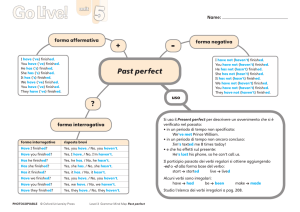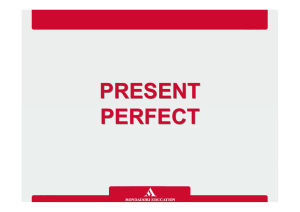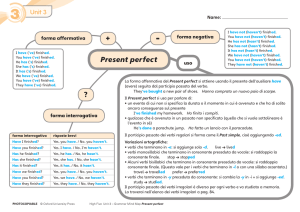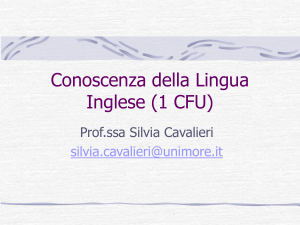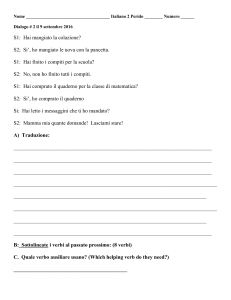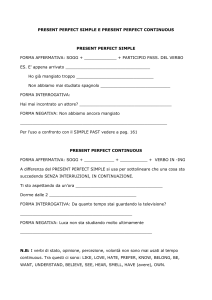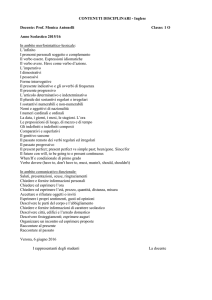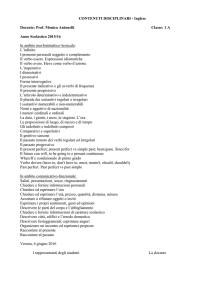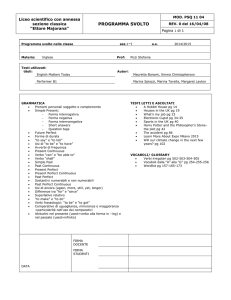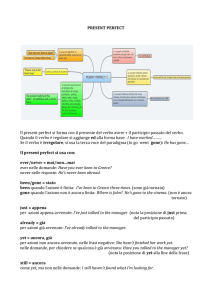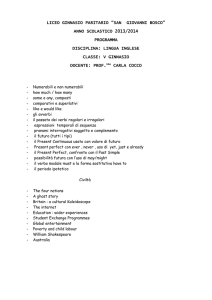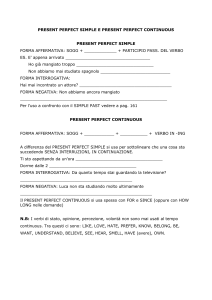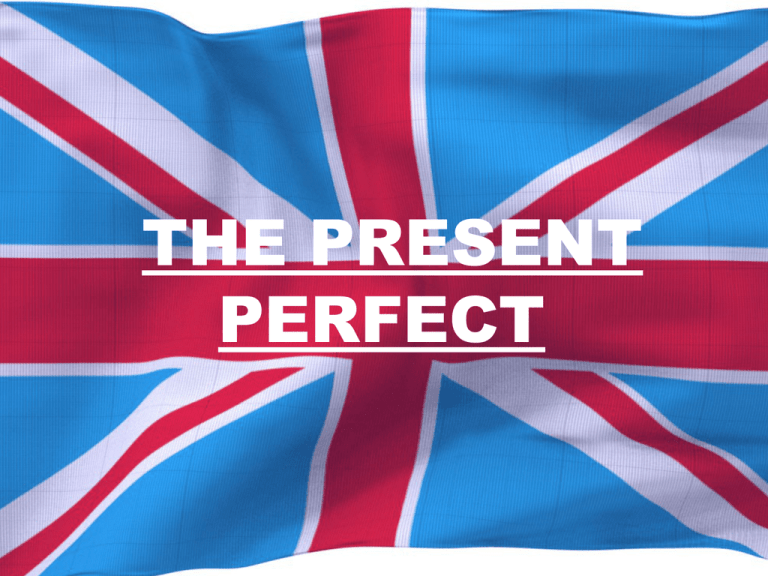
THE PRESENT
PERFECT
Il PRESENT PERFECT si usa per indicare un
evento o una situazione che hanno
conseguenze sul presente o per parlare di
un'azione iniziata nel passato e che continua
nel presente.
Esempi:
I have studied English and French (Ho
studiato Inglese e Francese).
Have you made the cake? (Hai fatto il
dolce?)
Il PRESENT PERFECT si forma con HAVE/HAS + participio
passato del verbo. Il participio passato dei verbi regolari si
forma aggiungendo ED alla forma base come per il past simple.
ll participio passato dei verbi irregolari ha una forma propria
che deve essere imparata a memoria (a volte è uguale al past
simple).
Esempi:
Forma base
Past simple
Participio passato (Past
Participle)
finish (finire)
finished
finished (verbo regolare)
watch (guardare)
watched
watched (verbo regolare)
buy (comprare)
bought
bought (verbo irregolare)
go (andare)
went
gone (verbo irregolare)
Forma: Verbo TO FINISH (finire)
FORMA AFFERMATIVA
I HAVE FINISHED (ho finito)
YOU HAVE FINISHED
HE/SHE/IT HAS FINISHED
WE HAVE FINISHED
YOU HAVE FINISHED
THEY HAVE FINISHED
FORMA AFFERMATIVA
CONTRATTA
I' VE FINISHED
YOU' VE FINISHED
HE/SHE/IT'S FINISHED
WE'VE FINISHED
YOU'VE FINISHED
THEY'VE FINISHED
FORMA NEGATIVA
FORMA NEGATIVA
I HAVE NOT FINISHED(Non ho finito)
CONTRATTA
I HAVEN'T FINISHED
YOU HAVE NOT FINISHED
HE/SHE/ITHAS NOT FINISHED YOU HAVEN'T FINISHED
WE HAVE NOT FINISHED HE/SHE/IT HASN'T FINISHED
WE HAVEN'T FINISHED
YOU HAVE NOT FINISHED
YOU HAVEN'T FINISHED
THEY HAVE NOT FINISHED
THEY HAVEN'T FINISHED
FORMA INTERROGATIVA
HAVE I FINISHED? (Ho finito?)
HAVE YOU FINISHED?
HAS HE/SHE/IT
FINISHED?
HAVE WE FINISHED?
HAVE YOU FINISHED?
HAVE THEY FINISHED?
RISPOSTE BREVI
Si usa la forma affermativa e
negativa di HAVE
Esempio
Yes, I have; No, I haven't
Yes, He has; No, He hasn't
ALCUNI VERBI IRREGOLARI.......
Forma base
Past simple
Participio passato
(Past
Participle)
READ (leggere)
WRITE (scrivere)
SEE (vedere)
SPEAK (parlare)
TAKE (prendere)
READ
WROTE
SAW
SPOKE
TOOK
READ
WRITTEN
SEEN
SPOKEN
TAKEN
Esempi:
Have you finished your homework? (Hai finito i compiti?)
Yes, I have. (Si)
Has he taken the bus at 7 o' clock? (Ha lui preso l'autobus alle 7.00?)
No, he hasn't. (No)
EVER e NEVER
Si usano EVER e NEVER (mai) con il Present Perfect per
parlare di esperienze senza specificare quando si sono
verificate; ever nelle frasi interrogative; never nelle frasi con
il verbo alla forma affermativa.
♣
Esempi:
Have you ever played football? (Hai mai giocato a calcio?)
I have never seen that film (Non ho mai visto quel film)
JUST
Si usa JUST (appena) con il Present Perfect per parlare
di cose che si sono appena fatte.
♣
Esempio:
I have just washed my hair (mi sono appena lavata i capelli)
BEEN/GONE
Il participio passato di BE è BEEN. Il participio
passato di GO è GONE.
Si usa BEEN per dire che qualcuno è stato in
un posto ed è tornato.
♣
Esempio:
I have been to London (Sono stato a Londra).
Si usa GONE per indicare che qualcuno è
andato in un posto, ma non è ancora tornato.
♣
Esempio
My friend has gone to the USA (Il mio amico è
andato negli Stati Uniti)
ALREADY; NOT YET; YET
Si usa ALREADY(già) con il Present Perfect per parlare di
cose che si sono già fatte.
♣
Esempio:
I have already had my breakfast (ho già fatto colazione)
Si usa NOT YET (non ancora) in frasi negative, posto in
fondo alla frase, per dire che un'azione che ci si aspetta deve
ancora succedere:
♣
Esempio:
I haven't eaten yet (non ho ancora mangiato)
Si usa YET (già) in frasi interrogative, posto in fondo alla
frase, per verificare se l'azione che ci si aspetta è già avvenuta
♣
Esempio:
Have you eaten yet? (Hai già mangiato?)
Espressioni di tempo
Si usa il Present Perfect con espressioni di tempo
non finito tra cui recently (recentemente), this
week (questa settimana), this year (quest'anno).
Esempi:
I haven't seen my best friend this week (Non ho
visto il mio migliore amico questa settimana).
♣
She has got married recently (Si è sposata
recentemente).
♣
This year I have done much sport (Quest'anno ho
fatto molto sport).
♣
DURATION FORM (Forma di durata)
Per descrivere la durata di un'azione, che iniziata nel passato
è ancora in corso, si usa il PRESENT PERFECT CONTINUOUS
+ le preposizioni FOR/SINCE
♣
STRUTTURA DEL PRESENT PERFECT CONTINUOUS:
Ausiliare have/has been + verbo principale in -ing +
for/since. (questa costruzione viene detta Forma di Durata,
Duration Form).
Si usano le preposizioni FOR o SINCE (in italiano tradotte con
“da”) per introdurre la durata o l'inizio dell'azione:
♣
- FOR indica il periodo di durata
- SINCE indica il momento in cui è iniziata l'azione
Esempi:
I have been working in the department store for two months
(lavoro in questo grande magazzino da due mesi)
I have been playing tennis since 2005 (gioco a tennis dal 2005
e continuo ancora a giocare)
♣ Il Present Perfect Continuous si usa anche nelle domande
introdotte da “How Long” (Da quanto tempo)
Esempio: How long have you been reading this book?
(Da quanto tempo leggi questo libro?)
I have been reading this book for two hours (leggo questo libro
da due ore).
♣ Si
usa il Present Perfect Simple anziché il Present
Perfect Continuous nei seguenti casi:
● nelle
frasi negative
Esempio: He hasn't played tennis since he was twelve (non gioca
a tennis da quando aveva 12 anni)
● con
I verbi di:
- STATO (be = essere)
- SENTIMENTO (like = pacere; love= amare; hate=odiare; hear= udire)
- ATTIVITA' MENTALE (know = conoscere, sapere; understand= capire).
-VOLONTA' (want= volere)
- POSSESSO (have got= avere)

